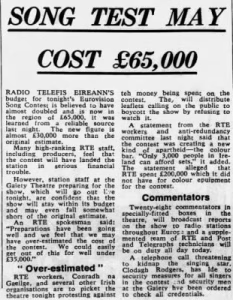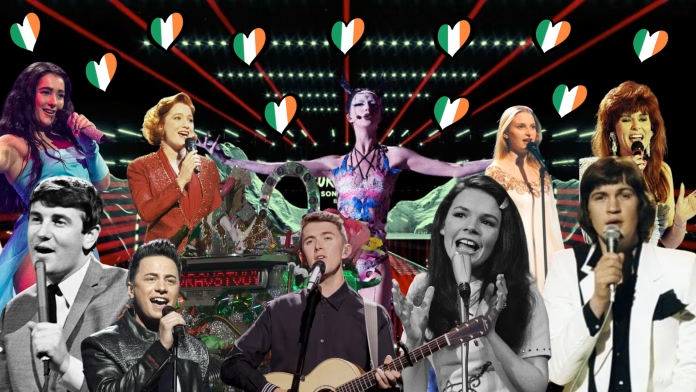7 wins, 57 entries, 60 years.
It’s an anniversary that should be marked – 60 years since Ireland debuted at the Eurovision Song Contest.
A lot has happened in those 60 years – culturally, politically, socially, economically, geographically, and of course within the Contest itself. So it’s only right that we look back.
It all started on March 20th 1965, when a budding Irish man named Butch Moore appeared on European television screens in 17 participating nations, as well as five who did not take part, including East Germany and Czechoslovakia.
Moore finished in sixth place, receiving 11 points on the night – 5 from Italy, and 3 apiece from Portugal and Yugoslavia.
That night was what sparked a sixty-year relationship with a contest that brought us many high moments, many low moments, and many “what did I just watch?” moments.
It would only take another five contests for the Emerald Isle to achieve its first win – in 1970 with Dana’s “All Kinds of Everything”.
For a small island country like Ireland to win a major European song contest was certainly a feat in itself, but that was only the beginning of our golden age, which would continue a short while later.
The first Eurovision Song Contest held in Ireland took place in the Gaiety Theatre on April 3rd 1971, with 18 countries participating – a record-equalling figure achieved in two previous contests, in 1965 and 1966.
The Gaiety Theatre was chosen as the venue for Eurovision 1971 as it was celebrating 100 years since its establishment in 1871.
The Irish Independent reported back in 1971 that the overall cost of hosting the contest was £65,000 – more than double the original £30,000 estimate.

The first Irish contest was also a contest of numerous firsts. It was the first contest to allow up to six people on stage, abolishing the previous rule of allowing only solo or duo performances.
It also marked the first time that Australia broadcasted Eurovision, through its Network 7 channel. They would then continuously broadcast each year through the SBS from 1983.
It was also the first and only time that second and third place entries were also awarded.
Monaco ended up victorious, with Séverine’s entry ‘Un banc, un arbre, une rue”. In yet another first for the contest, it would end up being the country’s first and only Eurovision win.
The following year, Ireland sent its first and only entry to be sung entirely in Irish. Sandie Jones performed “Ceol an Ghrá”, a song written by Irish playwright Liam Mac Uistín, as a tribute to his wife. Ireland finished in 15th place of 18 countries.
Ireland only had to wait until 1980 before it achieved its second win – with a young 25-year old Johnny Logan performing his now-iconic song “What’s Another Year?”, then again in 1987 with “Hold Me Now”.
It was then once the 1990s arrived, that Ireland’s gold streak took off.
Linda Martin, who previously participated in the 1984 contest with “Terminal 3”, won the 1992 contest with “Why Me?”, which was written by the old-reliable Johnny Logan.
In 1993, the contest was held at the Green Glens Arena in the quaint Cork town of Millstreet. The town still holds the record of being the Eurovision host with the smallest population, of just 1,500 people.
While RTÉ organisers were happy with the choice, after being offered the Arena for free by its owner Noel C Duggan, it appeared that not all were pleased with the decision – including BBC news anchor Nicholas Witchell, who was forced to apologise after remarking on-air that the contest was to be held in “a cowshed in Ireland”.
That year’s contest was won by Ireland’s Niamh Kavanagh, with the song “In Your Eyes”. Ireland was fourth nation to achieve victories in two successive years.
RTÉ opted to keep the following year’s contest in Dublin, this time being held in the Point Theatre.
It was in the 1994 contest that a major Irish cultural moment would occur – the first appearance of Riverdance.
A seven-minute performance broadcast to at least 34 countries across the world was met with a massive reaction, becoming a worldwide phenomenon which would tour the world in the years and decades after.
That year’s contest was won, again, by Ireland – with Paul Harrington and Charlie McGettigan taking the gold with the song “Rock ‘n’ Roll Kids”. The victory would make history, becoming the first time that any country won the contest in three consecutive years. It was also a record sixth win for the Emerald Isle.
Ireland’s hopes of a fourth win in a row were cut short when Norway’s Nocturne won in 1995. Ireland finished in 14th place that year, with the show once again held in the Point Theatre.
We didn’t have to wait much longer for our seventh win – with Eimear Quinn winning the contest the following year, with the song “The Voice”.
Since then, Ireland hasn’t been as lucky in its winning chances. The closest to a win was in 1997, when Marc Roberts came second with the song “Mysterious Woman”.
After that, as we rolled into the 21st century, the new challenge for Ireland was qualification from semi-finals – introduced thanks to the expansion of the contest.
Ireland has only qualified from 7 of 18 semi-finals the country has had to compete in, with 2024 breaking a four-contest streak of non-qualifications from 2019 to 2023 (excluding 2020, which was cancelled).
In those 7 qualifications, we have earned a grand total of 702 points – 278 of which came in the 2024 contest, where Bambie Thug finished in sixth place with the song “Doomsday Blue” – our best result since Jedward’s eighth place in 2011, with the song “Lipstick”.
Now, we can just hope for even more success at Eurovision over the next 60 years and beyond!





